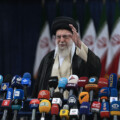The saintly editors here at The Hub have agreed to my request to produce one of my two monthly articles for the site as a monthly transatlantic diary. For those readers not familiar with the format, which is more common in British journalism, the diary is a grab bag of short items, sometimes on a common theme, but often not. In my case, what they have in common is that they are either too inconsequential to merit a full article or I can’t be bothered to come up with more than a knee-jerk reaction or a flip comment. This is October.
’In Paradise, the fruits were ripe the first minute, and in Heaven it is always autumn.” I can’t speak for paradise, but Donne’s apothegm has certainly applied to Oxford’s heavenly autumn this year. The sun has stayed its sentence on the year long enough to keep October bright and warm and the wet river mist away. The leaves are only lately turning brown and gold, as though the brick terraces of North Oxford have donned a tweed coat in reluctant concession to the season.
One advantage to spending the fall in England is the smell of burning leaves. I don’t know when or why we stopped backyard burns in Canada, but whatever smug gains it has secured cannot compensate for the loss of the most evocative smells of fall. Burning leaves are to October what pine needles are to December. It’s a smell that runs through human history. Bonfires have been beacons, warnings, and celebrations since man mastered fire, and their banishment is one more way we have cut ourselves off from the past, one more thing we no longer share with our ancestors.
* * *
As idyllic as Oxford has been this fall, it hasn’t been insulated from worldly cares. The outside world intruded this month in the form of ragged mobs parading through the city cheering Hamas’ “resistance.” I heard the rabble from my desk in the library at All Souls, a soaring neoclassical oasis in the heart of Oxford that is usually so quiet the briefest chair-squeak or scrupulously suppressed cough echoes through the sepulchral hush like the opening cannonade at Austerlitz. On this day, the muffled rhythm of protest chants penetrated the thick walls, and I ventured out into Radcliffe Square in time to hear the chants of “From Oxford to Gaza, long live the intifada.” The parade, which was organised by an outfit called the Socialist Worker Student Society, was dominated by young progressives. I sincerely hope none of them know that the main weapon of the last intifada was 140 suicide bombings targeting Israeli civilians and that calling for intifada in Oxford is a call to kill Jews here too. I say I hope, but…honestly, these days.
Even considering the pitiful education these students have received, youthful ignorance or general stupidity can be no excuse. The now-routine refrain “from the river to the sea, Palestine will be free,” is, in this context, a call for antisemitic genocide. I don’t care what you think you are saying, if you repeat those words immediately after a Hamas massacre, you can’t complain if people take it to mean what it means in Hamas’ Charter, which is the end of the state of Israel: “Hamas rejects any alternative to the full and complete liberation of Palestine, from the river to the sea.” Similarly, if “resistance” sounds suspiciously like a euphemism for the slaughter of civilians, it’s because that’s what Hamas means by it. Again, I don’t care what you think you’re saying, right now for “resistance” can reasonably be understood to mean what Hamas means by it: “Hamas rejects any attempt to undermine the resistance and its arms.” If you mean something else, then I suggest choosing words that aren’t lifted verbatim from the playbook of a listed terrorist organisation that hunts down and kills Jews in their homes. For now, “resistance” means what we saw on October 7th, as several prominent organisers have been good enough to make clear.
How did so many of the best-educated young people in the West come to believe the world’s only Jewish state is illegitimate? It is clear that social media, and especially TikTok’s algorithms, are shaping the worldview of our youngest and future citizens. Effectively, this means the Chinese Communist Party is taking control of public opinion. Why we haven’t shut down this weapon of cold war manipulation is a mystery. It doesn’t help that our schools have reduced the teaching of history to Lenin’s crude dictum, “Who? Whom?” producing a generation that conflates relative power with absolute morality. The elevation of victimhood to the highest good makes it inconceivable to many students that the side of might could be in the right, or that weakness can corrupt every bit as much as power. Why we surrendered control over education policy to university education faculties—the least intellectual and most ideological part of our education system—is baffling. Why even putatively conservative governments are doing nothing to push back is inexplicable.
* * *
Towards the end of the month, I popped down to London for dinner at the House of Lords. When I worked in the PMO, two of the prints in my Langevin office were replicas of the monumental Daniel Maclise paintings that grace the two long walls of the Royal Chamber, one of Wellington meeting Blücher after the Battle of Waterloo and the other of the death of Nelson at Trafalgar. It was a rare treat to see them in person. The room, however, looked like a builder’s site with great rolls of blue carpet stacked haphazardly in preparation for His Majesty’s first opening of Parliament as King next month. This follows the prorogation of Parliament this month, before which several bills received royal assent for the first time since 1951 with the words “Le Roy le vault.” After buying my first Charles III stamp and receiving my first Charles III coin as change this month, this really drove home the fact of the royal succession. Now, barring unthinkable calamity, it will be “Le Roy” for at least the next 75 years. How comforting it is to know the next two heads of state so far in advance; few peoples in history have been able to look so far into the future with such assurance.

Dinner itself was lively and both expectedly and unexpectedly amusing. Our host’s quick wit and charm were expected, but the unexpected came when the conversation turned to the state of Britain’s global influence. I was bemused to hear that the delusion that attends sententious Canadian discussions of “our role in the world” extends to the British variation on the theme. According to one guest—a blustery cove with the stentorian confidence of an Englishman accustomed to life on an ex-pat pay packet in one of the lesser former colonies—the imminent eclipse of the gerontocratic American empire is the opening Britain has been waiting for to reclaim the title of Top Nation. Of course, Britain has greater enduring relevance than we do—it helps that they have a mostly-functioning military—but on that dubious foundation this chap would construct a neo-imperialist vision of such burlesque hubris that I half expected him to propose that we sail that night from Greenwich, armed with our bread knives and a barrel of Lords’ vintage port, to reconquer Mesopotamia. The performance reminded me of Frederick Lee, the last Secretary of State for the Colonies, who must have continued to file his reports, sharpen his pencils, and flirt with the tea lady, carrying on as his predecessors had done for two centuries, naggingly aware that there were no more colonies out there beyond his office door, waiting for someone to turn out the lights (as the government finally did on that office in 1966, though news of it has apparently yet to reach my whilom dinner companion).
I don’t know if it’s reassuring or not to learn that the stubborn unreality with which our government and their panel-show courtiers face the world is not an exclusively Canadian problem. Leaders on both sides of the Atlantic seem to be taking their cue from the late General Sir Anthony Cecil Hogmanay Melchett: “If nothing else works, a total pig-headed unwillingness to look facts in the face will see us through.” I suppose it “worked” in the killing fields of France. Eventually.
Recommended for You

‘A celebration of the spirit of Alberta’: Ryan Hastman on the political, economic, and cultural importance of the Calgary Stampede

Michael Geist: Children accessing porn is a problem, but government-approved age verification technologies are not the answer

Daniel Zekveld: Age verification for pornography is not government overreach

Michael Bonner: Are we witnessing the last gasp of Iran’s Islamic Republic?




